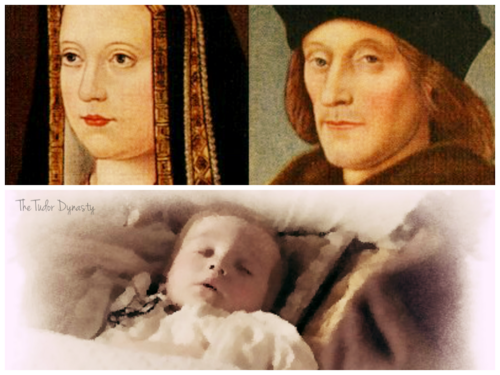-
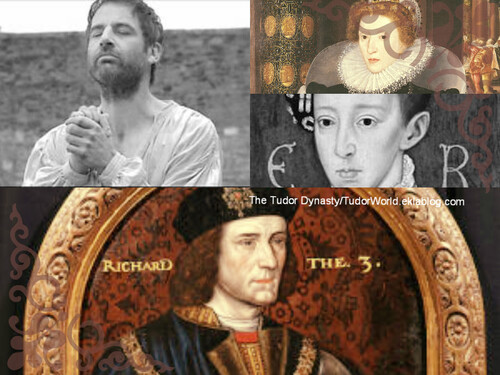
06 July 1189 – Death of Henry II of England

1348 – Pope Clement VI issues a papal bull protecting the Jews accused of having caused the Black Death.

1483 – Richard III is crowned King of England.

1535 – Execution of Sir Thomas More
A bit before 9:00 a.m., More is led from his cell on the 200-yard trip to Tower Hill. A large crowd is waiting at the execution site. More asks the crowd to pray for him in this world, and he would pray for them in the next. He says he was "the King's good servant, but God's first." He knelt down on the block, then rose to kiss his executioner. He knelt down again, his face was covered with a cloth and his neck on the block, and was killed with a single stroke of the axe. His head was boiled and impaled on a pole by London Bridge.
On the 1st July 1535, Master Thomas Murio, chancellor of England, was brought before the judges and the accusations against him read in his presence. The Chancellor and the duke of Norfolk turned to him and said, "You, Master More, have gravely erred against the King; nevertheless we hope by his clemency that if you repent and correct your obstinate opinion in which you have so rashly persevered, you will receive pardon."He replied "My lords, I thank you very heartily for your good will. I pray God preserve me in my just opinion even to death. As to the accusation against me, I fear words, memory, and judgment would alike fail me to reply to such a length of articles, especially considering my present imprisonment and great infirmity."A chair was then ordered to be placed for him, and he proceeded as follows:—
"As to the first article, charging me with having always maliciously opposed the King's second marriage, I will only answer that what I have said has been according to my conscience. I never wished to conceal the truth, and if I had, I should have been a traitor. For this error, if error it should be called, I have been condemned to perpetual imprisonment, which I have already suffered for fifteen months, and my goods confiscated. For this reason I will only reply to the principal charge against me, that I have incurred the penalty of the Statute made in the last Parliament since I was in prison, by refusing to the King his title of Supreme Head of the Church, in proof of which you allege my reply to the Secretary and Council, that as I was dead to the world, I did not care to think of such things, but only of the passion of Christ. I reply that your Statute cannot condemn me to death for such silence, for neither your Statute nor any laws in the world punish people except for words or deeds,—surely not for keeping silence."To this the King's proctor replied that such silence was a certain proof of malice intended against the Statute, especially as every faithful subject, on being questioned about the Statute, was obliged to answer categorically that the Statute was good and wholesome. "Surely," replied More, "if what the common law says is true, that he who is silent seems to consent, my silence should rather be taken as approval than contempt of your Statute. You say that all good subjects are obliged to reply; but I say that the faithful subject is more bound to his conscience and his soul than to anything else in the world, provided his conscience, like mine, does not raise scandal or sedition, and I assure you that I have never discovered what is in my conscience to any person living.
"As to the second article, that I have conspired against the Statute by writing eight letters to the bishop of Rochester, advising him to disobey it, I could wish these letters had been read in public, but as you say the Bishop has burnt them, I will tell you the substance of them. Some were about private matters connected with our old friendship. Another was a reply to one of his asking how I had answered in the Tower to the first examination about the statute. I said that I had informed my conscience, and so he also ought to do the same. I swear that this was the tenor of the letters, for which I cannot be condemned by your statute.
"Touching the third article, that when I was examined by the Council, I answered that your Statute was like a two-edged sword, for he who approved it would ruin his soul, and he who contradicted it, his body; and that the bishop of Rochester answered similarly, showing that we were confederates, I reply that I only answered thus conditionally, that if the Statute cut both ways like a two-edged sword, how could a man behave so as not to incur either danger? I do not know how the Bishop replied, but if he answered like me, it must have been from the agreement between us in opinion, but not because we had ever arranged it between us. Be assured I never did or said anything maliciously against the Statute, but it may be that this has been maliciously reported to the King."
Then they ordered an usher to summon 12 men according to the custom of the country, and these articles were given to them that they might judge whether More had maliciously contravened the Statute. After a quarter of an hour's absence they declared him guilty of death, and sentence was pronounced by the Chancellor "selon la lettre de la noble loy."
More then spoke as follows: "Since I am condemned, and God knows how, I wish to speak freely of your Statute, for the discharge of my conscience. For the seven years that I have studied the matter, I have not read in any approved doctor of the Church that a temporal lord could or ought to be head of the spiritualty."The Chancellor interrupting him, said, "What, More, you wish to be considered wiser and of better conscience than all the bishops and nobles of the realm?" To this More replied, "My lord, for one bishop of your opinion I have a hundred saints of mine; and for one parliament of yours, and God knows of what kind, I have all the General Councils for 1,000 years, and for one kingdom I have France and all the kingdoms of Christendom."Norfolk told him that now his malice was clear. More replied, "What I say is necessary for discharge of my conscience and satisfaction of my soul, and to this I call God to witness, the sole Searcher of human hearts. I say further, that your Statute is ill made, because you have sworn never to do anything against the Church, which through all Christendom is one and undivided, and you have no authority, without the common consent of all Christians, to make a law or Act of Parliament or Council against the union of Christendom. I know well that the reason why you have condemned me is because I have never been willing to consent to the King's second marriage; but I hope in the divine goodness and mercy, that as St. Paul and St. Stephen whom he persecuted, are now friends in Paradise, so we, though differing in this world, shall be united in perfect charity in the other. I pray God to protect the King and give him good counsel."
On his way to the Tower one of his daughters, named Margaret, pushed through the archers and guards, and held him in her embrace some time without being able to speak. Afterwards More, asking leave of the archers, bade her have patience, for it was God's will, and she had long known the secret of his heart. After going 10 or 12 steps she returned and embraced him again, to which he said nothing, except to bid her pray to God for his soul; and this without tears or change of colour. On the Tuesday following he was beheaded in the open space in front of the Tower. A little before his death he asked those present to pray to God for him and he would do the same for them [in the other world.] He then besought them earnestly to pray to God to give the King good counsel, protesting that he died his faithful servant, but God's first.
Such was the miserable end of More, who was formerly in great reputation, and much loved by the King, his master, and regarded by all as a good man, even to his death.

1553 –Death of Edward VI of England, son of Henry VIII and Jane Seymour, Edward was the third monarch of the Tudor dynasty and England's first monarch raised as a Protestant. During Edward's reign, the realm was governed by a Regency Council because he never reached his majority. The Council was first led by his uncle Edward Seymour, 1st Duke of Somerset, (1547–1549), and then by John Dudley, 1st Earl of Warwick, from 1551 Duke of Northumberland.

1557 – King Philip II of Spain, consort of Queen Mary I of England, sets out from Dover to war with France, which eventually resulted in the loss of the City of Calais, the last English possession on the continent, and Mary I never seeing her husband again.

1560 – The Treaty of Edinburgh is signed by Scotland and England.
The Treaty of Edinburgh (also known as the Treaty of Leith) was a treaty drawn up on 5 July 1560 between the Commissioners of Queen Elizabeth of England with the assent of the Scottish Lords of the Congregation, and the French representatives of King Francis II of France (husband of Mary Queen of Scots) to formally conclude the Siege of Leith and replace the Auld Alliance with France with a new Anglo-Scottish accord, while maintaining the peace between England and France agreed by the Treaty of Cateau-Cambresis

source:http://www.british-history.ac.uk/
-
4 July 1415-Pope Gregory XII Resigns at Council of Constance
1519-Followers of Martin Luther Described as Lutherans for First Time

1533 - Burning of John Frith, reformer, at Smithfield for heresy.
1534 – Christian III is elected King of Denmark and Norway in the town of Rye.
1551 – Death of Gregory Cromwell, 1st Baron Cromwell, English politician and son of Thomas Cromwell, 1st Earl of Essex.In 1537, Gregory married Elizabeth, Lady Ughtred, widow of Sir Anthony Ughtred, sister to Jane Seymour and therefore became brother-in-law to Henry VIII and uncle to Edward VI

****************************************
5 July 1321 – Birth of Joan of The Tower, wife of David II of Scotland
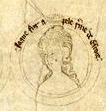
1345-Forced Baptism of Jews is Banned by Pope Clement VI
1375 – Death of Charles III, Count of Alençon
1535-Sir Thomas More's wife, Alice, visits her husband in the Tower. He gives her a letter composed in charcoal for his daughter Margaret. By this time, he also knows that his sentence had been commuted by Henry from disembowelment to beheading.
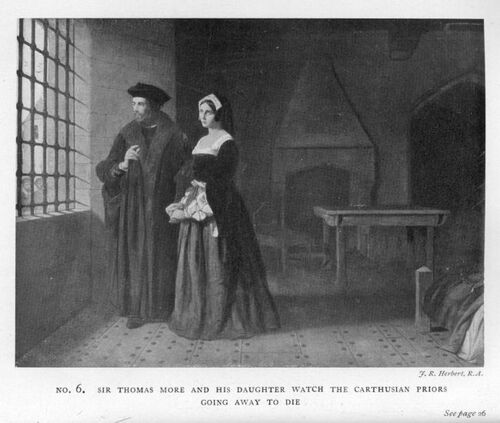
"Our Lord bless you good daughter and your good husband and your little boy and all yours and all my children and all my godchildren and all our friends. Recommend me when you may to my good daughter Cecily whom I beseech our Lord to comfort, and I send her my blessing and to all her children and pray her to pray for me. I send her an handkercher and God comfort my good son her husband. My good daughter Daunce hath the picture in parchment that you delivered me from r my Lady Conyers, her name is on the back side. Shew her that I heartily pray her that you may send it in my name to her again for a token from me to pray for me.
I like special well Dorothy Colly, I pray you be good unto her. I would wit whether this be she that you wrote me of. If not, I pray you be good to the other as you may in her affliction, and to my good daughter Joan Aleyn to give her I pray you some kind answer, for she sued hither to me this day to pray you be good to her.
I cumber you, good Margaret, much, but I would be sorry, if it should be any longer than tomorrow, for it is Saint Thomas' Even and the Vtas of Saint Peter and therefore tomorrow long I to go to God, it were a day very meet and convenient for me. I never liked your manner toward me better than when you kissed me last for I love when daughterly love and dear charity hath not leisure to look to worldly courtesy.
Fare well my dear child and pray for me, and I shall for you and all your friends that we may merrily meet in heaven. I thank you for your great cost.
I send now unto my good daughter Clement her algorism stone and I send her and my good son and all hers God's blessing and mine.
I pray you at time convenient recommend me to my good son John More. I liked well his natural fashion. Our Lord bless him and his good wife my loving daughter, to whom I pray him be good, as he hath great cause, and that if the land of mine come to his hand, he break not my will concerning his sister Daunce. And our Lord bless Thomas and Austin and all that they shall have."
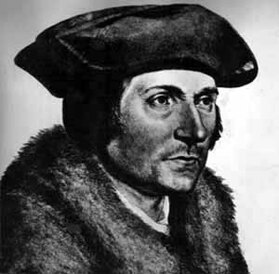
1547 –Birth of Garzia de' Medici, son of Cosimo I de' Medici, Grand Duke of Tuscany

1554 – Birth of Elisabeth of Austria, Queen of France
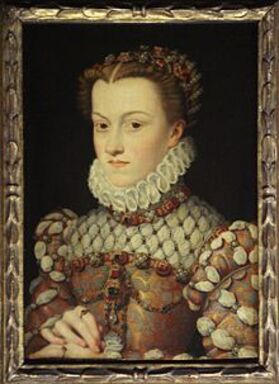
1594 – Portuguese forces under the command of Pedro Lopes de Sousa begins an unsuccessful invasion of the Kingdom of Kandy during the Campaign of Danture in Sri Lanka.
source:wikipedia,http://www.british-history.ac.uk/,the tudors wiki
-
3 July 1423 – Birth of Louis XI of France
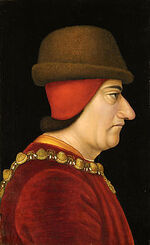
1495 – Perkin Warbeck, pretender to the English throne landed at Deal in Kent with men and ships.
On 3 July 1495, funded by Margaret of Burgundy, Warbeck landed at Deal in Kent, hoping for a show of popular support. Warbeck's small army was routed and 150 of the pretender’s troops were killed without Warbeck even disembarking. He was forced to retreat almost immediately, this time to Ireland. There he found support from Maurice FitzGerald, 9th Earl of Desmond, and laid siege to Waterford, but, meeting resistance, he fled to Scotland. Henry pardoned his Irish supporters, remarking drily "I suppose they will crown an ape next".
Warbeck was well received by James IV of Scotland who realised that his presence gave him international leverage. As Ferdinand and Isabella of Spain were negotiating an alliance with Henry VII, James IV knew that Spain would help him in his struggles with England, in order to prevent the situation escalating into war with France.Spanish ambassadors arrived in Edinburgh, and later Pedro de Ayala was established as a resident ambassador during the crisis. Warbeck was permitted to marry James's distant cousin, Lady Catherine Gordon, a daughter of George Gordon, 2nd Earl of Huntly. The marriage was celebrated in Edinburgh with a tournament. James gave Warbeck clothes for the wedding and armour covered with purple silk.The historian Katie Stevenson suggests the clothing bought for the tournament shows Warbeck fought in a team with the king and four knights.A copy of a love letter in Latin obtained by Pedro de Ayala, is thought to be Warbeck's proposal to Lady Catherine.
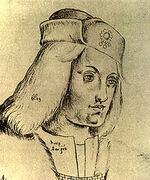
1533 - Catherine of Aragon was visited by a deputation of Councillors led by Lord Mountjoy. She was told that if she would submit to the King's wishes he would provide her with a handsome estate but that if she persisted in her obstinacy things would go badly for her daughter and servants.William Blount,her chamberlain, was ordered to inform Catherine again that she must recognise her new title of ‘Princess Dowager’ and not use the title of ‘Queen’.
Instructions for the right honorable lord Mountjoye and Gryffith [Richardes] to be declared to the Princess Dowager.
1. They shall say to her that "after declaration made by Vaux concerning her removing ... and given to the said Vaux therein, commanded his council to give ear unto the same, and to determine in that behalf as appertaineth to his princely honor and estate." The King has always had a special regard to the preservation ... and subjects, and to keep the same in tranquillity ; and now, considering that, notwithstanding sundry monitions given to the Princess Dowager not to use the name of Queen, as the King, finding his conscience violated, grudged, and grieved by that unlawful matrimony contracted between him and the Dowager, which was defined and determined by a great number of the most famous universities and clerks of Christendom "to be detestable, abominable, execrable, and directly against the laws of God and nature," was therefore lawfully divorced, and by advice of all his nobles, spiritual and temporal, and all the commons of his realm, was married to the lady Anne, who has been crowned Queen.
As the King cannot have two wives he cannot permit the Dowager to persist in calling herself by the name of Queen, especially considering how benignantly and honorably she has been treated in the realm. She is to satisfy herself with the name of Dowager, as prescribed by the Act of Parliament, and must beware of the danger if she attempt to contravene it, which will only irritate the feelings of the people against her. If she be not persuaded by these arguments to avoid the King's indignation, and relent from her vehement arrogancy, the King will be compelled to punish her servants, and withdraw her affection from his daughter. Finally, that as the marriage is irrevocable, and has passed the consent of Parliament, nothing that she can do will annul it, and she will only incur the displeasure of Almighty God and of the King.
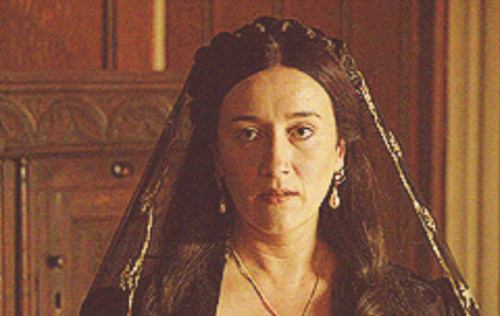
The Divorce.
The report of lord Mountjoye, [Katharine's chamberlain,] Sir R[obert] Dymok, knight, John Tyrell, Gryf[fith] Richards, and Thomas [Vaul]x, upon certain articles by the King's most honorable Co[uncil] delivered unto them to declare unto the Princess Dowager, on the King's high[ness'] behalf.
To the effect that on Thursday, 3 July, they found her lying on a pallet, as she had pricked her foot with a pin, and could not stand, and was also sore annoyed with a cough. On our declaring that our instructions were to her as Princess Dowager, she took exception to the name, persisting that she was the King's true wife, and her children were legitimate, which she would claim to be true during her life. To our assertion that the marriage with Anne Boleyn had been adjudged lawful by the universities, the Lords and Commons, she said the King might do in his realm by his royal power what he would ; that the cause was not theirs but the Pope's to judge, as she had already answered the duke of Norfolk. To other arguments, that she might damage her daughter and servants, she replied she would not damn her own soul on any consideration, or for any promises the King might make her. She did not defend her cause upon obstinacy, nor to create any dissension in the realm, but to save her own rights ; and as for the withdrawing of the King's affection from her, she would daily pray for the preservation of his estate ; but as she sues by his licence, she trusts in so doing to lose no part of his favor. In fine, she will not abandon the title till such time as a sentence is given to the contrary by the Pope. She asked for a copy of these instructions, which she would translate into Spanish, and send to Rome.
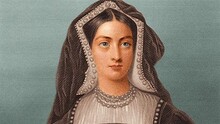
1557 - Mary I and Philip II set out for Dover for war with France
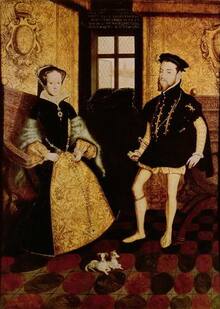
1570 – Death of Aonio Paleario, Italian reformer
1585-William Davies was imprisoned in the Tower for harbouring Catholics
source:the tudors wiki,wikipedia
-
2 July 1214 - Battle of La Roche-aux-Moines
The Battle of Roche-au-Moine was a battle between the Kingdom of France and the Kingdom of England in 1214. When John besieged the castle, he retreated after he was refused support from Angevin nobles.

1298 - The Battle of Göllheim
The Battle of Göllheim was fought on 2 July 1298 between Albert I of Habsburg and Adolf of Nassau-Weilburg.
1298 – Death of Adolf, King of Germany
1363 – Birth of Maria, Queen of Sicily
1489 - Birth of Thomas Cranmer ,leader of the English Reformation and Archbishop of Canterbury during the reigns of Henry VIII, Edward VI and, for a short time, Mary I. He helped build the case for the annulment of Henry's marriage to Catherine of Aragon, which was one of the causes of the separation of the English Church from union with the Holy See. Along with Thomas Cromwell, he supported the principle of Royal Supremacy, in which the king was considered sovereign over the Church within his realm.
During Cranmer's tenure as Archbishop of Canterbury, he was responsible for establishing the first doctrinal and liturgical structures of the reformed Church of England. Under Henry's rule, Cranmer did not make many radical changes in the Church, due to power struggles between religious conservatives and reformers. However, he succeeded in publishing the first officially authorised vernacular service, the Exhortation and Litany.
When Edward came to the throne, Cranmer was able to promote major reforms. He wrote and compiled the first two editions of the Book of Common Prayer, a complete liturgy for the English Church. With the assistance of several Continental reformers to whom he gave refuge, he developed new doctrinal standards in areas such as the Eucharist, clerical celibacy, the role of images in places of worship, and the veneration of saints. Cranmer promulgated the new doctrines through the Prayer Book, the Homilies and other publications.
After the accession of the Roman Catholic Mary I, Cranmer was put on trial for treason and heresy. Imprisoned for over two years and under pressure from Church authorities, he made several recantations and apparently reconciled himself with the Roman Catholic Church. However, on the day of his execution, he withdrew his recantations, to die a heretic to Roman Catholics and a martyr for the principles of the English Reformation. Cranmer's death was immortalised in John Foxe's Book of Martyrs and his legacy lives on within the Church of England through the Book of Common Prayer and the Thirty-Nine Articles, an Anglican statement of faith derived from his work.

1492 – Birth of Elizabeth Tudor,the second daughter and fourth child of Henry VII of England and Elizabeth of York.
Elizabeth spent much of her short life at the royal nursery of Eltham Palace, Kent, with her brother Prince Henry (the future King Henry VIII) and her sister Princess Margaret (later Queen of Scotland) under the guidance of a Lady Mistress, presided over by her mother. Elizabeth's oldest brother, Prince Arthur, as heir to the throne, was brought up separately in his own household. Just before her death, Henry VII proposed a marriage alliance between Elizabeth and the French Prince, Francis, who later became King Francis I of France.Princess Elizabeth died on Monday 14 September 1495 after suffering from Atrophy at the age of three years and two months. Elizabeth was brought from Eltham in state and buried on the north side of St. Edward the Confessor's Shrine in Westminster Abbey on Friday the 27th. Princess Elizabeth was the first of four of King Henry and Queen Elizabeth's children to die prematurely and they were greatly affected.
1503-Margaret Tudor departs Richmond Palace to begin her journey to Scotland. She made a stop at her grandmother Margaret Beaufort’s estate at Collyweston, and then continued on the way north.
Richard Grafton describes Margaret's journey to Scotland for her wedding:
"Thus this fair lady was conveyed with a great company of lords, ladies, knights, esquires and gentlemen until she came to Berwick and from there to a village called Lambton Kirk in Scotland where the king with the flower of Scotland was ready to receive her, to whom the earl of Northumberland according to his commission delivered her."
And later he says:
"Then this lady was taken to the town of Edinburgh, and there the day after King James IV in the presence of all his nobility married the said princess, and feasted the English lords, and showed them jousts and other pastimes, very honourably, after the fashion of this rude country. When all things were done and finished according to their commission the earl of Surrey with all the English lords and ladies returned to their country, giving more praise to the manhood than to the good manner and nature of Scotland."

1504 – Death of Stephen III of Moldavia
1536 - Thomas Cromwell appointed Keeper of the Privy Seal

1566 – Death of Nostradamus, French astrologer and author

source: http://tudorhistory.org/,wikipedia
